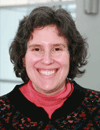Susan Sharfstein,
Associate Professor,
University of Albany
Susan Sharfstein received her B.S. in chemical engineering with honors from Caltech in 1987 and her Ph.D. in chemical engineering from UC Berkeley in 1993, receiving graduate fellowships from the university and the National Science Foundation. She received a National Institutes of Health Individual Research Service Award to pursue postdoctoral studies, initially at UC Berkeley and subsequently at the UCLA Medical School. Dr. Sharfstein joined the faculty at the University of Toledo in Bioengineering in 1996. In 2000, she received a National Science Foundation POWRE award to study glycobiology at the New York State Department of Health Wadsworth Laboratories. In 2001, she joined the Department of Chemical and Biological Engineering at Rensselaer Polytechnic Institute and in 2007 she received a dual appointment in Biology. In 2010, she joined the faculty at the College of Nanoscale Science and Engineering at the University at Albany as an Associate Professor of Nanobioscience. Professor Sharfstein received an NSF CAREER grant in 2000 for her work on hyperosmotic stress responses of hybridoma cells and the School of Engineering Education Excellence Award and the Class of 1951 Outstanding Teaching Award in 2007. She is the author of nearly 40 papers and book chapters in the field of mammalian cell biotechnology.
|

|
|

 Add to Calendar ▼2011-07-21 11:45:002011-07-21 12:45:00Europe/LondonMetabolic Engineering of CHO cells for Production of Heparin: New Paradigms for GlycoengineeringSELECTBIOenquiries@selectbiosciences.com
Add to Calendar ▼2011-07-21 11:45:002011-07-21 12:45:00Europe/LondonMetabolic Engineering of CHO cells for Production of Heparin: New Paradigms for GlycoengineeringSELECTBIOenquiries@selectbiosciences.com Add to Calendar ▼2011-07-20 00:00:002011-07-21 00:00:00Europe/LondonCell Culture, Engineering and Formulation TechniquesSELECTBIOenquiries@selectbiosciences.com
Add to Calendar ▼2011-07-20 00:00:002011-07-21 00:00:00Europe/LondonCell Culture, Engineering and Formulation TechniquesSELECTBIOenquiries@selectbiosciences.com